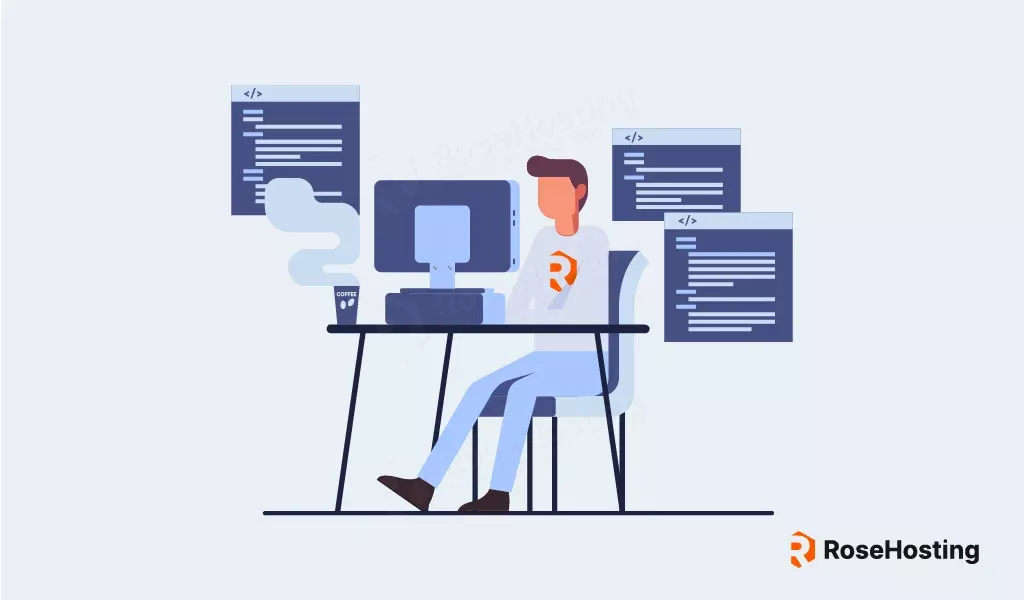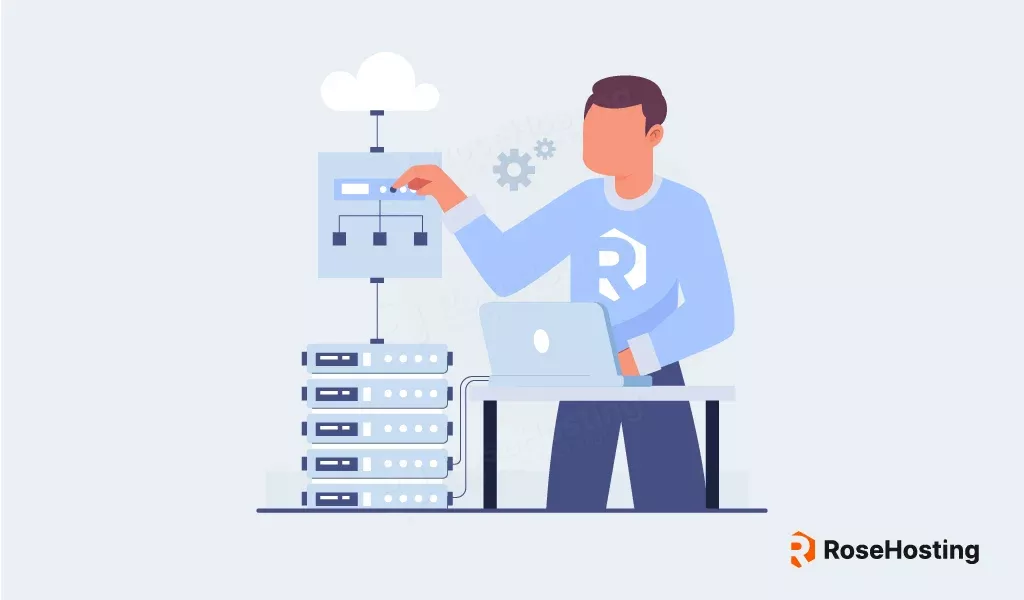
Level 3 Support is the highest tier of technical support a hosting company can provide you with. Unlike level 1 or 2, level 3 support can be provided only by the most knowledgeable, skilled, and tenured professionals. Additionally, they need to have extensive knowledge of tools and resources to resolve your issue directly.
As an example, Linux hosting enables you to use free, open-source software. It is the most secure and reliable operating system and is ultimately the best hosting type for running your website. This, however, doesn’t mean that everything always runs smoothly.
Even with countless online resources available with a quick Google search, a website on a Linux server can be tricky to manage compared to its Windows alternatives. You need to either have good technical skills or the support of seasoned experts to assist you at every turn.
Table of Contents
Why should you care about Level 3 support for Linux?
Installing updates and making changes to your server may not be easy if you lack sufficient Linux knowledge.
A lack of expertise might lead you to ignore Linux-related concerns or address them haphazardly. Doing either can make your website vulnerable to attacks or result in you damaging and losing your website entirely. To avoid this, your website needs to be supported by someone who has extensive knowledge of servers. They also need experience in detecting and resolving errors, optimizing your systems for better performance, and more. Being able to mitigate risks and being proactive is why great technical support is vital to running your website.
Your Options
Getting such support can be quite hard to find, but there are several ways to have it. You can learn about Linux, get Linux certifications and become a Linux professional, or hire Linux administrators and build own support team. Finally, you can use fully managed hosting from a web hosting provider.
The first two options have some heavy caveats. Learning about Linux and gaining experience takes years of troubleshooting issues and researching solutions. This takes a lot of time, even more so if you have never worked with a command line interface. If you don’t know what a command line interface is, then this option is not for you.
Hiring your own Linux administrators and forming a team for your business is a huge undertaking. There are interviews, vetting, training, and so on. Not to mention the huge cost of paying for multiple people’s salaries so they look after your servers. Then there’s benefits, paid time off, extra paperwork… the list goes on. Having an in-house support team has mainly one upside – their familiarity with your systems. The rest is just downsides.
The third option is by far the easiest to work with. Getting fully managed hosting gives you all of the benefits of a dedicated support team with none of the downsides. The cost is extremely affordable compared to hiring even one person to look after your servers.
No matter what you choose, you need to remember this when choosing a managed hosting provider: not all managed support is made equal.
After all, having support that can’t help with your issue is as bad as not having any support at all.
When choosing your support team, it’s key to provide your business with expert Linux administrators who can effectively attend to your needs.
What is a Linux administrator?

Linux administrators are responsible for maintaining the systems and servers that keep your website running.
Depending on the team’s level of expertise, they might be in charge of performing responsibilities such as troubleshooting issues, configuring software, performing setups, and optimizing the overall performance of your website. It’s important to note that not all Linux administrators perform said responsibilities. Some might be more skilled or experienced than others. Those with more experience can resolve more issues and carry out a wider range of tasks.
Linux administrators and support teams are divided into levels. These range from Level 1 support to Level 3 support or similar categories according to their skills, experience, and duties.
Level 1 support
Level 1, or L1, is assigned to support staff with little to no experience in the field.
For Linux administrators, being L1 means that they have basic knowledge of Linux servers and systems. They possess some of the necessary skills, and are capable of performing basic tasks within Linux, such as restarting a service. However, they might find some tasks difficult as they don’t possess the same level of expertise as Level 2 support.
Level 2 support
Level 2, or L2, on the other hand, is assigned to support staff with more skills and experience than L1 support. They are capable of handling concerns that might be too difficult for their L1 counterparts.
For Linux admins, L2 means being more familiar with how Linux systems and software work and being able to resolve concerns that require a higher level of technical know-how and expertise, such as fixing an error in a configuration file. Their more robust technical skillset enables them to fix many server-related issues.
If they find themselves with an issue that is too complex or out of their scope, then the issue should be handled by Level 3 support.
Level 3 support
Level 3, or L3, is assigned to support staff with the highest technical knowledge and expertise in an organization. They are regarded as experts in what they specialize in.
L3 Linux administrators are considered to be the most skilled out of the bunch. Apart from being able to perform both L1 and L2 Linux administrators’ tasks, they are also in charge of handling the most complex problems and making improvements to optimize the overall performance of your website. As the most knowledgeable members of a support team, they’re usually reserved to handle the most critical of concerns.
Knowing the extent of your Linux administrator’s expertise and what they’re capable of doing will help you hire the right people and give your website the right type of support it needs.
Choosing the right Linux support for your website

Choosing the right hosting provider will require thorough assessment from your end. This includes your current website speed and security for example. Is your website taking a long time to load? You may need to get that fixed with the help of a professional.
Second, how often you are met with an issue that you don’t know how to solve? If you often find yourself looking up an error message or if you don’t have a backup solution set up, you should definitely speak to an expert.
Third, how much do you want to spend on support? If your budget is only a few dollars a month, then you will have to figure things out yourself. Keep in mind that in this case, you’ll be paying with your time to find solutions by yourself.
As mentioned earlier, there’s three ways to get support for your Linux server and websites. You can do it yourself, pay someone to do it for you, or you can get managed hosting.
Doing it yourself costs you a lot of time and effort.
Paying someone else will cost you a fortune, not to mention training and all risks associated with hiring employees.
The Managed Solution
Finally, there’s managed hosting, which has the best blend of all benefits with almost no downsides. For that reason alone, we will be focusing mainly on managed VPS hosting from here on out. Most businesses will be comfortable spending fifty dollars per month to ensure their website is always running well and is safe from harm.
Managed hosting providers give you a balance of the three points listed earlier. They can help speed up your website by optimizing your server’s software. They can solve almost any problem that you run into, whether that’s an OS issue or a configuration issue. Not to mention, the cost of managed hosting is very reasonable considering your hosting is included in the price. Let’s discuss what you get with a managed web hosting provider.
Get Managed Hosting
Subscribing to a managed hosting plan gives you access to technical support team provided by the hosting provider. This set of professionals is then tasked with assisting you with your server and website-related concerns that you’ll encounter while running your business.
This option is ideal for website owners who have neither the expertise nor time to resolve said issues or vet, hire and manage their own technical support. With managed hosting, you outsource those responsibilities to the web hosting provider you choose.
Managed vs. Fully Managed
It’s crucial for website owners to determine whether the web hosting provider offers managed or fully managed support. Compared to the former, fully managed support teams cater to a broader range of concerns and provide more in-depth and proactive solutions and services to keep your website in tip-top shape.
When choosing between managed or fully managed hosting, double-check their services as an added precaution. Asking and getting in touch with their sales team will not only help you clarify the extent of support they’re willing to give you, but also allow you to get a glimpse of the type of support you’ll experience if you ever do decide to host with them.
Things to Consider
You should look into a web hosting provider’s support channels – are they available only through ticket, or live chat too? Other features such as working hours, response times, and customer experiences are also important when choosing a hosting provider.
Multiple support channels and reachability are qualities a great web hosting provider must have since this gives you multiple ways to reach them. This is vital, especially if you just have a quick question not worth opening a ticket for.
Response Time, or how long it takes for support to respond to messages and resolve concerns, is another factor many website owners fail to consider when choosing technical support. Though at first glance it doesn’t sound important, choosing between a web hosting provider that responds in minutes as opposed to a provider that responds on an hourly basis can make all the difference for your website.
A minute lost when contacting support can result in bad user experiences, loss in sales, and dissatisfied customers. This is crucial if you run into your site being down for example. Having to wait for an hour for support will almost certainly lead to lost revenue.
Customer Feedback
The type of support your web hosting provider gives is another thing you should look into. Reading reviews and going on forums lets you know how web hosting providers tend to handle, escalate, and resolve your concerns. If you take note of how fast issues were resolved and how effective their solutions were, you can even determine how knowledgeable their support team is.
The uptime guarantee, presented with a percentage, refers to how much a web hosting provider can guarantee your website stays up. This is also a good measure of how good your support team is going to be. Different hosting providers have different uptimes, and a higher percentage means they pay greater attention to detail in maintaining reliable services. For good measure, be sure to compare uptimes and verify them by checking customer reviews.
Finding “The One”
Choosing a web hosting provider and entrusting their support team with your business’ technical concerns isn’t an easy commitment to make. You need to make sure that the support team you’ll be entrusting your website to are experts. They need to be able to resolve any issue that might come their way. On top of that, their goal is to optimize and keep your website secure.
Here at RoseHosting, our support team consists exclusively of Level 3 support Linux Administrators with in-depth knowledge and expertise. Our team is well-versed in maintaining and optimizing Linux systems and servers. This means our clients get to experience expert-level support at all times, whenever they need it.
Whichever hosting plan you decide to go with, make sure that it comes with a quality and proactive support team that will put your needs first.
Key Takeaways
While different needs may require different kinds of technical support, one thing remains clear. To have a top-performing website, you need to have expert technical support. They need to help you strategize, resolve, and prepare for any issues that might come your way.
When choosing said support, you need to do your research. Only go for businesses that are upfront with what they can and can’t do for you. Don’t trust support teams that promise you the world and then some.